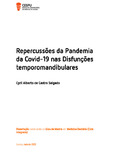| dc.contributor.advisor | CARDOSO, MÓNICA ALEXANDRA GUEDES | |
| dc.contributor.author | Salgado, Cyril Alberto de Castro | |
| dc.date.accessioned | 2023-11-21T15:57:13Z | |
| dc.date.available | 2023-11-21T15:57:13Z | |
| dc.date.issued | 2023 | |
| dc.identifier.uri | http://hdl.handle.net/20.500.11816/4340 | |
| dc.description.abstract | Introdução - A pandemia da COVID-19, causada pelo SARS-CoV-2, resultou em confinamentos e quarentenas, levando ao isolamento social e à solidão, contribuindo para o surgimento de distúrbios psicológicos, como ansiedade, depressão e stress, aumentando o risco do desenvolvimento ou agravamento das Disfunções Temporomandibulares (DTM's).
Objetivos - Avaliar as Repercussões da Pandemia da COVID-19 no desenvolvimento das DTM`s.
Metodologia - Pesquisa realizada na base de dados Pubmed com as seguintes combinações: “COVID-19” AND “TDM”. Os critérios de exclusão foram os seguintes, artigos cujo título e/ou resumo não se enquadram na temática e artigos de revisão. Foram encontrados 75 artigos na pesquisa, dos quais 20 foram selecionados.
Resultados - Estudos comprovam que a COVID-19 tem um impacto negativo nos sintomas das DTM´s. A pandemia e o isolamento social afetaram os níveis de ansiedade, stress e depressão, além de aumentar o Bruxismo. Ficou evidenciado que o sexo feminino é mais suscetível de desenvolver DTM. O uso prolongado da máscara pode aumentar o risco de DTM, especialmente quando usada por mais de 8 horas por dia. Além disso, a personalidade tipo D é mais suscetível no desenvolvimento de DTM.
Discussão - É de extrema importância para o tratamento das DTM`s haver uma abordagem não só dos fatores físicos, mas também dos fatores sociais e emocionais.
Conclusão - A pandemia da Covid-19 e o isolamento social, têm como efeito um aumento de distúrbios psicológicos acabando por ter repercussões diretas no desenvolvimento de DTM´s. | pt_PT |
| dc.description.abstract | Introduction - The COVID-19 pandemic, caused by SARS-CoV-2, has resulted in lockdowns and quarantines, leading to social isolation and loneliness and has contributed to the emergence of psychological disorders such as anxiety, depression, and stress, increasing the risk of developing or worsening Temporomandibular Disorders (TMDs).
Objectives - To evaluate the repercussions of the COVID-19 pandemic on the development of TMDs.
Methodology - A Research was conducted in the Pubmed database using the following combinations: "COVID-19" AND "TMD". The exclusion criteria were as follows: articles whose titles and/or abstracts did not fit the theme as well as review articles. A total of 75 articles were found in the search, of which, 20 were selected.
Results - Studies have show that COVID-19 has a negative impact on TMD symptoms. The pandemic and social isolation have affected levels of anxiety, stress, and depression, while also increasing bruxism and other dysfunctions. It was evident that females are more susceptible to developing TMDs. Prolonged use of masks may increase the risk of TMD, especially when worn for more than 8 hours a day. Additionally, Type D personality is more susceptible to the development of TMDs.
Discussion - It is of utmost importance for the treatment of TMDs to have an approach that considers not only physical factors but also social and emotional factors.
Conclusion - The Covid-19 pandemic and social isolation have resulted in an increase in psychological disorders, leading to direct repercussions on the development of TMDs. | pt_PT |
| dc.language.iso | por | pt_PT |
| dc.rights | info:eu-repo/semantics/openAccess | pt_PT |
| dc.subject | Covid-19 | pt_PT |
| dc.subject | Pandemic | pt_PT |
| dc.subject | Temporomandibular disorders | pt_PT |
| dc.subject | Stress | pt_PT |
| dc.subject | Anxiety | pt_PT |
| dc.title | Repercussões da Pandemia da Covid-19 nas Disfunções temporomandibulares | pt_PT |
| dc.type | info:eu-repo/semantics/masterThesis | pt_PT |
| dc.identifier.tid | 203358651 | pt_PT |
| thesis.degree.name | Mestrado em Medicina Dentária | pt_PT |

